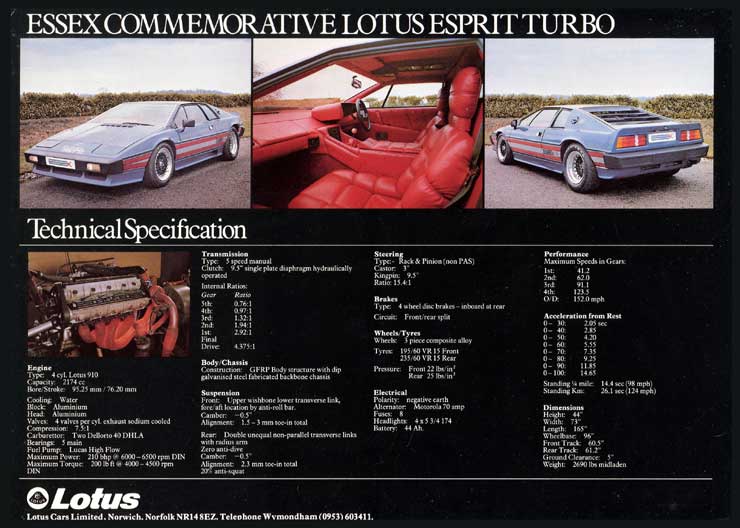

Esprit de Car
1981 Lotus Essex Esprit Turbo
Autoweek Magazine, March 2004
www.autoweek.com
by Jan TeglerBy 1981 Colin Chapman’s team Lotus had won an awesome six Formula One world drivers’ championships and seven constructors’ titles, plus the Indy 500. This on-track success was mirrored by success on the street, where Chapman’s philosophy of lightweight, technologically advanced racing cars had translated neatly into elegant production sports cars with impeccable handling. The Lotus 7, Elite and Elan had all been successful, but the company’s latest offering, the Esprit, was proving not as popular a model.
Successor to the Europa, the Esprit debuted in 1975, the result of a Giorgio Giugiaro design study first shown at Turin in 1972. The show car’s reception was so favorable, Chapman decided Lotus must make it a reality. In terms of quality and performance, though, the S1 fell well short of supercar expectations, jogging to 60 mph in 8.4 seconds. The S2, on the scene in 1978, offered some gains, but these were largely cosmetic. Chapman knew he must find a way to lift the performance of the Esprit to return Lotus to the same level of acclaim on the street it had achieved on the track. The answer? A turbo.
The Essex Commemorative Edition Esprit premiered in 1980 at an extravagant party at London’s Royal Albert Hall. Finished in the same blue, red and silver Essex Petroleum livery as Mario Andretti and Elio de Angelis’ Lotus 81 racers, the Esprit finally had the performance to match its splashy image.
Lotus replaced the 2.0-liter, 160-hp twin-cam four-cylinder with a larger 2.2-liter unit featuring a Garrett turbocharger feeding twin Dell’Orto carburetors. The blown motor gave the Esprit the grunt it needed, pushing horsepower to 210 at 6500 rpm and dropping 0-to-60 times to 5.6 seconds. Top speed was more than 140 mph. True to its heritage, the mid-engined Esprit already had supercar handling, but even this was improved. The car’s unique backbone chassis was mated to a wider front box section and a new space-frame engine and transmission section at the rear. A race car-like independent upper-wishbone/lower-transverse-link suspension up front paired with unequal-length transverse links in back made the new Esprit incredibly sure-footed.
Chapman also wanted the Turbo’s styling to stand out from previous Esprits. Giugiaro modified the lines of the original body with a deeper front spoiler, NACA ducts, a louvered engine cover and larger rear spoiler.
Only 100 Essex Esprits were produced. None were available here (US). Bill Bonta, of Phoenix, Maryland, owns one of only three Essexes that made it to America as gray-market cars. Priced at $50,000 in 1981, the original owner of Bonta’s car paid a $15,000 premium to have it federalized. Bonta, a longtime Lotus enthusiast, had lusted after the Turbo Esprit for some time. In 1988, he spotted an ad for the Essex in AutoWeek’s classifieds. He had to have it.
Slipping inside the Essex’s cushy leather interior you face a full Smiths gauge cluster and dashboard controls for factory air. A center roof panel housing a special Panasonic stereo provides musical diversion, should you want that.
The fun begins when you select the first of the Essex’s five gears and take off. The car accelerates strongly, its 2.2-liter revving happily to the 7000-rpm redline with the sound of the carburetor wastegate in your ears between gears. The Citroën gearbox is good, but shifting can be tricky given the small footwell and extremely close pedal arrangement. Cornering power is outstanding, and though we pushed the Essex fairly hard, we could not come close to its limits on a public road. Steering is wonderfully direct and the ride on 15-inch wheels is far better than contemporary exotics. Thanks to the four Girling discs, the car stops with authority.
With the Essex Esprit Turbo, Lotus finally delivered on its promise of a supercar, kick-starting a steady production of Esprits that continues to this day. Chapman’s esprit de car can be felt in every example.
